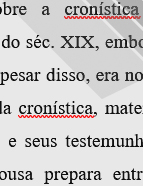

................................
In the early 1970s, when Portugal underwent a shift from a dictatorial regime to democracy, the landscape of the previous decade remained largely unchanged, despite an increase in the number of research undertakings. While, in the wake of the 1974 revolution, the discourse of the regime lost the apologetic tone of the "national achievements", the dominant theme in fact remained the same. Historians such as Torquato de Sousa Soares, Joaquim Verísssimo Serrão and Graça Rodrigues questioned 15th-century historiography in particular, taking it as the product of a specific period within a discursive dimension. Torquato Soares and Veríssimo Serrão even considered this chronicle production in the chapter of "historiography" (Soares, "A historiografia portuguesa..." [“Portuguese historiography”], 1977, pp. 67-86; Serrão, "Fernão Lopes...", 1984, pp. 195-211), not in the sense of a truthful discourse on the past, but rather according to the notion advanced later by Bernard Guenée: the attempt to establish a given memory of events and figures, despite the ideological, political and social constraints of the time. This was not, however, the dominant trend, and chronicle production was still seen as something quite distant from historiography. The concept of a history-science still appeared to hover over the intellect of historians.
Within 15th-century historiography, Maria Lúcia Passos , Mário Martins and José Hermano Saraiva continued to explore different themes in Fernão Lopes, the author who continued to receive the most attention, with analyses ranging from the hero's typology to the biblical and liturgical component of his texts. The literature on this chronicler continued to grow over the following decades, following both existing and new paths. The publication of the Crónica de D. João I by Lindley Cintra in 1977 was not unrelated to this fact. Braancamp Freire's 1915 edition was recovered for the first part, and William Entwistle's critical edition some fifty years earlier for the second part, thus facilitating access to the text. More recently, Teresa Amado tried to solve the problems of this version by preparing a critical edition whose first volume was published in 2018.
In fact, from 1980 onwards Teresa Amado stood out as one of the most important researchers and experts on Fernão Lopes' s work by producing texts where she systematised many of the existing studies on the chronicler, adding her philology-oriented perspective, as is the case of Fernão Lopes. Contador de História. [ Fernão Lopes. Storyteller] (1991).
